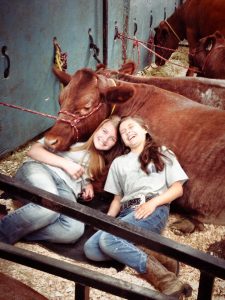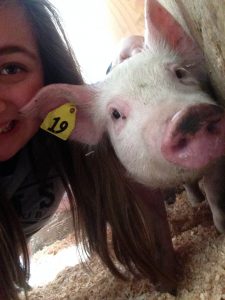After taking some time to reflect on the reading materials, I particularly resonated with Belasco’s “Why Study Food.”
Today for dinner I ate stir-fry. Eggplants from China, chicken from Canada, zucchini brightly labelled “Product of Mexico,” and more various ingredients from other parts of the world. That one very meal I had was its own global journey, one that I, and most other people, don’t think too much of while preparing or eating our meal, as Belasco references to Wendell Berry’s idea that we as consumers are “Industrial eaters”—and that the process between farmer, customer, plow, and plate have become mere anonymities and in that moment we are not acknowledging that eating is an agricultural act (5).
I was so intrigued by Belasco’s discourse surrounding the importance of food and that in the eyes of an everyday consumer, food and agriculture have become more anonymous as factory farms have their “handful of highly mechanized farmers [that] grow almost all of our food,” highlighting its global capital-intensive and tightly controlled reality (4). For me, growing up on a small, locally-owned beef farm over the years brought me closer to the earth, provided me with a sense of pride in the agricultural practices that I learned and upheld, and helped my awareness about the beef industry on a national level. I learned how factory farms work, and although they are comparably much better-operated in Canada than the USA, it still contributes to the idea of food anonymity, and further drove my goal to produce high-quality, locally-sourced products for our community. Living on a farm provided me with a behind-the-scenes view of how important food really is, considering I was a part of the production of it.
Being a part of this type of agricultural practice reminded me of how food quite literally shapes our world—market fluctuations, political tariffs on agricultural items, global food (in)security, identity, culture, etc. Yet so much of these practices from every level, local to international, remain with varying degrees of anonymity. That is why the study of food is critical, one to push for progress in the way we consume and produce food.


Tamara Mitchell
September 22, 2020 — 10:47 pm
This is a great connection between your lived experience and our course reading, and your family’s farm is doing important work to offset the anonymity that Belasco identifies. I’ve heard of local farms inviting consumers to meet animals and see the farm grounds (does your farm do that?)… I imagine that experience would be quite similar to what Avery mentioned in class today about the almost sacred nature of moose hunting and giving thanks to the animal.
The photos are so endearing that I almost forgot to comment on the content of your post!
Grey Figueroa Merado
September 25, 2020 — 11:06 am
Hi Ashley! Thanks for sharing your thoughts and connecting it to growing up on a farm. Most of my family are farmers living in Puerto Rico. On one side of the family, we grow beans, fruits, roots and chickens. On the other side, we raise livestock and have our own community garden for the family’s consumption.
After the hurricanes in 2017, my family’s farms were destroyed but the livestock was okay. Your mention of how our lives are shaped by the food is absolutely true. They had to totally switch gears to survive economically and food security was definitely effected for my family. Luckily, the community where my family lives worked together to rebuild what everyone lost.
During this time, I was in Canada. While I was on the phone with my aunt, she was telling me all the fruit trees we lost in the hurricane from our land. Coincidently, I had all of those fruits in a bowl, on my table. Thinking back on the moment, I realize how incredible the disconnect between seed to table is. Even through natural disasters, droughts, heat waves etc, we can still go buy bananas and avocados at the market with no second thought on how much work went into growing that food or if the person growing it has a banana or avocado of their own.
Anyways, thanks for sharing your thoughts on this week’s reading!
Grey
claire rowse
September 26, 2020 — 9:45 pm
Hi Ashley!
I couldn’t help but read your blog after seeing the title. I am admittently very jealous of your experience growing up on a small farm! It sounds like you truly embraced the experience and let it help you see the world from a special view! I dream to one day be apart of a small scale farm like you have been able to!
I find that I also grew up learning from the land and have always seen Mother Nature from a different perspective than the majority of my peers. I was always outside as a kid, in the mud, grass, swinging from the trees, or in our tiny family garden (my immune system is thankful for this). I can only imagine you had an even more immersive experience with all the livestock around!
Best Wishes,
Claire